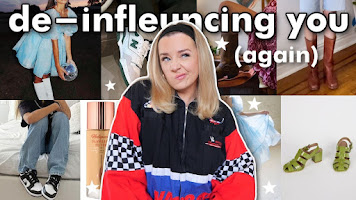The Trend of ‘De-influencing’: Does it Work?
by Maisie Spofford
Whether we like them or not, influencers are all over our social media feeds. The algorithm churns out sponsored content by all kinds of content creators. From nutritionists telling us the best supplements for our hair, to dog owners sharing their pet’s favorite treats, to fashion bloggers insisting on the next ‘must have’ trendy shoe, and celebrities pushing new big brand technology. In every corner we are influenced to buy. Sometimes, this content can feel inauthentic, as we don’t know if the influencer truly backs the product they promote or if they are just getting paid to. Does Millie Bobby Brown really use the £480 MetaQuest VR headset to play Roblox? Under a picture of Sabrina Carpenter posing with her Samsung GalaxyZFlip5, two popular commentors wrote ‘girl when does your contract with them end’ and ‘don’t lie u still have an iphone.’
Those of us chronically online are tired. Too many ‘must have’ products fall in and out of fashion and it is hard for the individual to decide what is worth spending their money on. ‘De-influencing’ attempts to dissociate our consumption choices from influencers' power and opinions. Some ‘de-influencing’ videos on Instagram and TikTok review over-hyped products and why we actually shouldn't buy them. A popular TikTok audio circulated, satirizing the trend: “I am here to de-influence you. Do not get the UGG Minis, do not get the Dyson Air Wrap, do not get the Charlotte Tilbury wand, do not get the Stanley Cup, do not get Colleen Hoover books, do not get the AirPods Pro Max. If you do any of those things… a bomb is gonna explode.”
At the core of ‘de-influencing’ is a desire for more conscious consumption and dissociation from current fads. However, on social media ‘de-influencing’ has become a trend, twisted into a concealed version of influencing. Many of the ‘de-influencing’ videos, while slating a certain product or brand, then refer to a different product to buy instead. In one TikTok, a creator uses the viral de-influencing audio over a video of her posing in a pair of jeans, with the text ‘but PLS get these Zara jeans!!’ Some creators also reacted against the aim of the audio, instead showing clips of themselves with nearly every product listed. Self-aware but also proud, one woman captions her TikTok ‘i’m an easy target.' By still perpetuating consumption, the ‘de-influencing’ trend then seems to be missing the point of sustainability at times. In reality, it is just another way social media tries to shape our opinions.
At Sustainable Style, we believe the best path to mindful consumption is following your own personal tastes, opinions, and values. When choosing to purchase new, we want to make a considered decision and put our money towards something that we can imagine having in our closets for years to come. If that’s the UGG minis, then that’s okay. But especially with a trending product, it’s important to ask yourself if you really love them, or if you like the idea of them that you’ve seen pushed on social media.
This year, I tried to make a conscious effort of ‘de-influencing’ myself by removing the temptations to consume. I unfollowed a lot of brands and influencers on Instagram. I also unsubscribed from brands’ email lists, so I didn’t get the almost daily temptation created by the words ‘SALE’ or ‘NEW IN.’ While I was inspired by the ‘de-influencing’ trend, upon reflecting on it further, I think it is important that we create our own mindful habits towards consumption rather than just following what others tell us to do, whether they’re telling us to buy or not. So don’t listen to me (even if I am trying to influence you a little bit), make a plan that works for YOU. Go ahead and try to recognize which areas of your life have the biggest influence on your buying habits. Is it your TikTok feed or your Pinterest board? Or the groupchat with your friends? Be mindful of the impact that others, online or IRL, have on your opinions. Always ask yourself why YOU love something and what longevity it has in your life before you buy it.




This article provides a thoughtful exploration of the 'de-influencing' trend, shedding light on the paradox of attempting to break free from influencer culture while still promoting alternatives. I love the emphasis on mindful consumption and personal values. It’s a great reminder to reflect on our choices and focus on what truly resonates with us rather than what’s trending. A must-read for anyone looking to navigate the complexities of social media influence
ReplyDeleteVisit now - Find My Style Fashion Australia